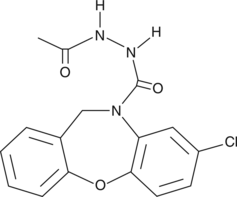Territorial Availability: Available through Bertin Technologies only in France
- Synonyms
- 8-chloro-dibenz[b,f][1,4]oxazepine-10(11H)-carboxy-(2-acetyl)hydrazide
- Correlated keywords
- PGE2 antagonists antinociceptives EP1 receptors selective prostaglandins SC19220 SC 19220 cancers bones research neurons survival PGs E2 pain neuronal growth suppression tumors metastasis dibenzoxazepine smooth muscles contractions guinea pigs ileum stomachs trachea humans mouse CHO cells vitamins D3 osteoclastogenesis breasts Parkinson’s diseases dopaminergic rats substantia nigra
- Product Overview:
The prostaglandin E2 (PGE2) receptor EP1 is involved in triggering PGE2-mediated pain, neuronal survival and growth as well as the suppression of tumor metastasis. SC-19220 is a dibenzoxazepine that acts as a selective antagonist of PGE2 at the EP1 receptor.{6742,2681} At doses between 0.3-300 µM, SC-19220 acts as a competitive antagonist of PGE2-induced smooth muscle contractions of guinea pig ileum and stomach.{6911,6856} SC-19220 also acts as a PGE2 antagonist in the EP1 receptor-mediated contraction of guinea pig trachea.{6294} SC-19220 displaces radiolabeled PGE2 from the cloned human EP1 receptor with an IC50 of 6.7 µM and exhibits no binding at the human EP2 receptor.{3176,3186} It binds with apparent low affinity to the cloned mouse EP1 receptor expressed in CHO cells.{6640} In a model of bone resorption, 3-150 ?M SC-19220 inhibited both 1,25 dihydroxy vitamin D3- and PGE2-stimulated osteoclastogenesis in mouse osteoclast precursors.{23818} Antagonism of EP1 with 1 ?M SC-19220 has been shown to promote metastasis in a mouse model of metastatic breast cancer.{18890} In a rodent model of Parkinson’s disease, 1.5 ?M SC-19220 prevented PGE2-mediated loss of dopaminergic neurons from rat substantia nigra.{15975}
Cayman Chemical’s mission is to help make research possible by supplying scientists worldwide with the basic research tools necessary for advancing human and animal health. Our utmost commitment to healthcare researchers is to offer the highest quality products with an affordable pricing policy.
Our scientists are experts in the synthesis, purification, and characterization of biochemicals ranging from small drug-like heterocycles to complex biolipids, fatty acids, and many others. We are also highly skilled in all aspects of assay and antibody development, protein expression, crystallization, and structure determination.
Over the past thirty years, Cayman developed a deep knowledge base in lipid biochemistry, including research involving the arachidonic acid cascade, inositol phosphates, and cannabinoids. This knowledge enabled the production of reagents of exceptional quality for cancer, oxidative injury, epigenetics, neuroscience, inflammation, metabolism, and many additional lines of research.
Our organic and analytical chemists specialize in the rapid development of manufacturing processes and analytical methods to carry out clinical and commercial GMP-API production. Pre-clinical drug discovery efforts are currently underway in the areas of bone restoration and repair, muscular dystrophy, oncology, and inflammation. A separate group of Ph.D.-level scientists are dedicated to offering Hit-to-Lead Discovery and Profiling Services for epigenetic targets. Our knowledgeable chemists can be contracted to perform complete sample analysis for analytes measured by the majority of our assays. We also offer a wide range of analytical services using LC-MS/MS, HPLC, GC, and many other techniques.
Accreditations
ISO/IEC 17025:2005
ISO Guide 34:2009
Cayman is a leader in the field of emerging drugs of abuse, providing high-purity Schedule I-V Controlled Substances to federally-licensed laboratories and qualified academic research institutions for forensic analyses. We are certified by ACLASS Accreditation Services with dual accreditation to ISO/IEC 17025:2005 and ISO Guide 34:2009.





